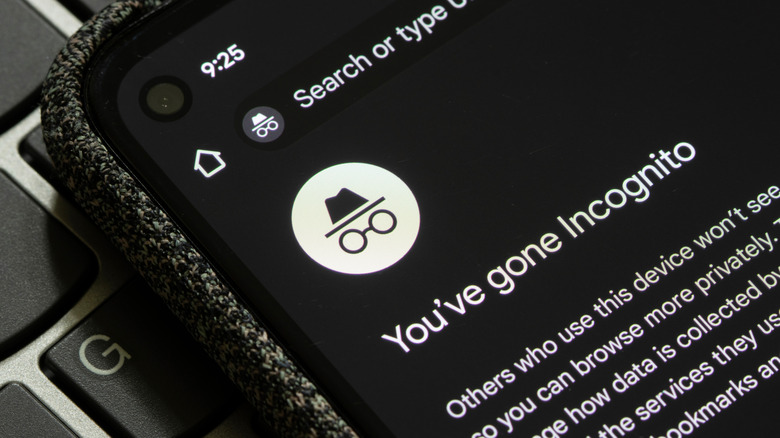Chrome's Incognito Mode Isn't As Private As It May Seem
Incognito mode has been around for so long that many believe it's a privacy tool. Going Incognito on Google Chrome feels like you're donning a trench coat, ball cap, and sunglasses, making you completely anonymous on the internet. Based on the iconography and wording, it's easy to believe that toggling Incognito mode makes you as untraceable as a spy. The reality is it doesn't.
Google Chrome (which will incidentally end support for macOS Big Sur very soon) does not turn into a privacy browser when using Incognito mode. People who work at Google know this, and they're outspoken about their dislike of Incognito mode and how it leads users to believe it can keep their information private. Google admitted it had been collecting data from users in Incognito mode, which came to light because of a class action lawsuit. In 2024, the company agreed to delete billions of data records as part of a settlement, which also made the company update the Incognito mode page to be more transparent about what it actually does.
Incognito mode doesn't make you invisible on the internet
Unlike a VPN, which can encrypt data and hide some activity from websites and your ISP, all Chrome does is offer you a clean browsing instance that will delete any local data immediately upon closing. While Chrome won't store any information locally on the device, such as browsing history and cookies, your activity can still be tracked by your ISP and the websites you visit when in Incognito mode.
Google will also collect user data shared by third-party sites and apps. For example, if you visit a website that uses Google Ads, any data collected could end up in Google's hands. This may include your IP address, along with the device and browser you're using. If you think this may change if Google is forced to sell Chrome, don't count on it.
Going Incognito also won't protect your privacy if you log onto a website or social media platform. Once you log onto Instagram, for example, your data is collected by the platform. And, if you're visiting the site in Incognito mode to hide your activity from your employer, think again. While your employer may not be able to track your every move on a website, they can see that you visited the site, which makes Incognito mode pointless.
What's the point of Incognito mode?
Chrome, which OpenAI says it would buy if Google is forced to sell, may not be the privacy browser of our dreams, but it does still have its uses. If you share your computer with others, browsing the internet in Incognito mode ensures your activity remains private from them. You can browse, log on to your social media accounts, or shop, knowing that the next person who logs on won't have access to your history. As soon as you close the Incognito window, your cookies and search history will be deleted as if you were never there.
You can also use Incognito mode to get a fresh perspective on a website. This is useful since many websites give you a unique experience based on your activity and preferences. If you want to see what YouTube looks like without the personalized algorithm, visit in Incognito mode. Similarly, Incognito mode can give you a more unbiased search result that doesn't take into account your search history.


